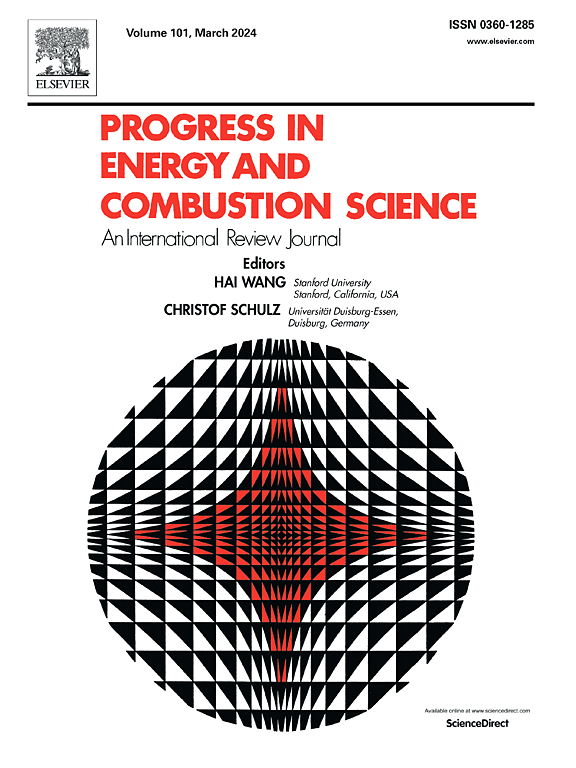Liquid biofuel powering the sustainable transport with a low-carbon emission: a review
IF 37
1区 工程技术
Q1 ENERGY & FUELS
引用次数: 0
Abstract
Abstract Energy consumption from transport has been increasing at a fast rate and become a major sector, which takes 29% of total global energy demand. Since transport energy consumption primarily relies on fossil fuels, it has resulted in serious carbon emissions and environmental degradation. Moreover, the volatility prices of fossil fuel and unstable international security have attracted keen interest for many developing and industrialized countries looking for sustainable and clean alternatives. Liquid biofuels, including but not limited to bioethanol, biodiesel, bio-jet fuel, are considered as the most promising alternative and more expansive role in powering sustainable transport, for its carbon neutral and low-emissions properties.
 Liquid biofuels contribute 4% of transport in 2020 and have been foreseen to continuously grow. Liquid biofuels can be produced by diverse technologies and commercialized in various ways, easy-adapt to technical and policy challenges. Major challenges include technical bottleneck, initial and operational cost, byproduct treatment, and associated environmental concern. This paper critically reviews: 1) Categories and production of different liquid biofuels; 2) Application scenarios of liquid biofuels; 3) Environmental impact assessment of liquid biofuels; 4) Opportunities and challenges of liquid biofuels; 5) Future perspectives.
 Each type of liquid biofuel requires specific production processes and has a strong correlation with biomass raw materials. Liquid biofuels find extensive applications in transportation, aviation, and other functional domains. In addition, the life cycle assessment of liquid biofuels is carried out from the numerous aspects of raw materials, pretreatment, production process, and application. Furthermore, this study analyzes the related policies, highlighting the challenges associated with the unstable supply of clean energy, raw materials, and quality control. Finally, the future perspectives of liquid biofuels were presented. This comprehensive review aims to provide a systematic understanding of liquid biofuels, covering their production and applications from multiple perspectives, while offering insights into future developments.液体生物燃料驱动低碳可持续交通:综述
交通运输能源消耗一直在快速增长,占全球能源总需求的29%,已成为一个重要的领域。由于交通运输能源消耗主要依赖化石燃料,造成了严重的碳排放和环境恶化。此外,矿物燃料价格的波动和国际安全的不稳定引起了许多发展中国家和工业化国家寻找可持续和清洁替代品的浓厚兴趣。液体生物燃料,包括但不限于生物乙醇、生物柴油、生物喷气燃料,因其碳中和和低排放的特性,被认为是最有前途的替代品,在可持续交通运输中发挥着更广泛的作用。到2020年,液体生物燃料将占交通运输的4%,预计将继续增长。液体生物燃料可以通过多种技术生产并以多种方式商业化,易于适应技术和政策挑战。主要挑战包括技术瓶颈、初始和运营成本、副产品处理以及相关的环境问题。本文主要综述:1)不同液体生物燃料的分类和生产;2)液体生物燃料的应用场景;3)液体生物燃料环境影响评价;4)液体生物燃料的机遇与挑战;5)未来展望。
每种类型的液体生物燃料都需要特定的生产工艺,并且与生物质原料有很强的相关性。液体生物燃料在交通运输、航空和其他功能领域有着广泛的应用。此外,从原料、预处理、生产工艺、应用等多个方面对液体生物燃料进行生命周期评估。此外,本研究还分析了相关政策,强调了与清洁能源、原材料供应不稳定和质量控制相关的挑战。最后,展望了液体生物燃料的发展前景。本综述旨在提供对液体生物燃料的系统了解,从多个角度涵盖其生产和应用,同时为未来的发展提供见解。
本文章由计算机程序翻译,如有差异,请以英文原文为准。
求助全文
约1分钟内获得全文
求助全文
来源期刊

Progress in Energy and Combustion Science
工程技术-工程:化工
CiteScore
59.30
自引率
0.70%
发文量
44
审稿时长
3 months
期刊介绍:
Progress in Energy and Combustion Science (PECS) publishes review articles covering all aspects of energy and combustion science. These articles offer a comprehensive, in-depth overview, evaluation, and discussion of specific topics. Given the importance of climate change and energy conservation, efficient combustion of fossil fuels and the development of sustainable energy systems are emphasized. Environmental protection requires limiting pollutants, including greenhouse gases, emitted from combustion and other energy-intensive systems. Additionally, combustion plays a vital role in process technology and materials science.
PECS features articles authored by internationally recognized experts in combustion, flames, fuel science and technology, and sustainable energy solutions. Each volume includes specially commissioned review articles providing orderly and concise surveys and scientific discussions on various aspects of combustion and energy. While not overly lengthy, these articles allow authors to thoroughly and comprehensively explore their subjects. They serve as valuable resources for researchers seeking knowledge beyond their own fields and for students and engineers in government and industrial research seeking comprehensive reviews and practical solutions.
 求助内容:
求助内容: 应助结果提醒方式:
应助结果提醒方式:


